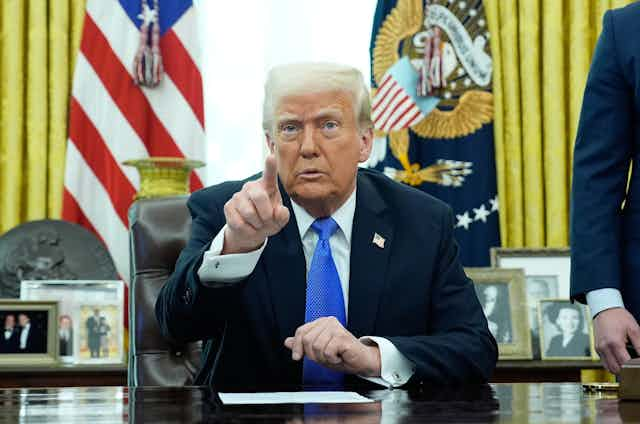June 2025 – Former U.S. President Donald Trump issued a series of pointed criticisms toward both Israel and Iran after reports emerged of renewed military strikes despite an earlier ceasefire announcement. The development underscored the volatile situation in the Middle East, with conflicting claims about de-escalation and fresh hostilities reported by multiple outlets.

Context: Announced Ceasefire Between Israel and Iran
On June 23, 2025, Donald Trump posted on the social media platform Truth Social claiming that Israel and Iran had agreed to a 12-hour ceasefire. In his statement, he indicated that both countries would halt military operations, describing the agreement as a significant step toward ending what he referred to as a 12-day conflict.
Trump’s post outlined a timeline in which Iran would begin the ceasefire, Israel would follow, and after 24 hours, the conflict would be formally declared over. He described this arrangement as preventing further escalation in the Middle East, suggesting it could avert a war that might otherwise last years.
Source: Reuters, [Truth Social posts cited by major outlets including AP News and BBC News]

Reports of Renewed Hostilities
Despite the ceasefire announcement, multiple news agencies reported that fighting resumed within hours. Iranian state media outlets, including Mizan News Agency, reported explosions in Tehran that were attributed to Israeli airstrikes targeting radar facilities and other military infrastructure. Similarly, Israeli media, including Israeli Army Radio, described the strikes as direct hits on strategic targets near Tehran.
Source: Reuters
These accounts suggested that the ceasefire agreement either failed to hold or was never fully implemented on the ground. Both governments did not immediately confirm the full scope of the strikes or casualties, and details remained limited at time of publication.
Trump’s Public Statements and Criticism
In the hours following these reports, Trump continued to post on Truth Social, directing criticism at both countries but singling out Israel in particular. He urged Israeli pilots not to conduct further strikes, warning that additional attacks would constitute a serious breach of the ceasefire arrangement he claimed to have helped broker.
He wrote messages instructing “all planes” to return and even appealed for a symbolic gesture of goodwill by suggesting pilots do a friendly wave. He explicitly warned Israel not to “drop those bombs” and insisted that violating the agreement would be unacceptable.
Source: Trump’s Truth Social posts as reported in BBC News, The Guardian
Speaking to reporters on the White House lawn before departing for the NATO Summit in The Hague, Netherlands, Trump expressed frustration with the situation. He stated that both Iran and Israel had violated the ceasefire and described the scale of the renewed bombing as unprecedented in his experience. He stressed his dissatisfaction with Israel’s decision to conduct strikes so soon after the deal was announced.
“I’m not happy with Israel. When I say you have 12 hours, you don’t go out in the first hour and just drop everything you have,” Trump told reporters. He also indicated plans to urge Israeli leaders to “calm down” to avoid further escalation.
Source: Anadolu Agency, Reuters

Broader Diplomatic Context
The reported ceasefire agreement and its apparent breach came against the backdrop of heightened tensions between Israel and Iran, whose longstanding rivalry includes disputes over Iran’s nuclear program, regional influence, and support for proxy groups such as Hezbollah.
According to the International Crisis Group and United Nations reporting, military clashes between the two nations have repeatedly threatened regional stability. Although direct, large-scale warfare has been relatively limited, the risk of escalation has long been a concern for international mediators, including the U.S. and European allies.
Source: International Crisis Group, United Nations Security Council Reports
Trump’s intervention came amid diplomatic efforts to de-escalate tensions. Although no formal peace treaty or multilateral negotiation involving Iran and Israel was underway at the time, the U.S. has historically played a key role in regional security arrangements. Observers noted that unilateral ceasefire announcements, particularly via social media, are unusual and often lack formal diplomatic backing needed to ensure compliance.
Source: Council on Foreign Relations, Carnegie Endowment for International Peace
Reaction from Media and Diplomats
International reaction to the reported breach was cautious. Diplomatic sources cited by Reuters and BBC described skepticism that any meaningful ceasefire could hold without verified commitments from both sides and robust mechanisms for monitoring compliance. Analysts pointed out that even during past escalations in Gaza, formal truces have typically required mediation by third-party states such as Egypt or Qatar.
Meanwhile, U.S. State Department officials, speaking anonymously to reporters, said they had seen no evidence of a formal ceasefire deal negotiated between Israel and Iran beyond the social media statements. They stressed the need for serious diplomatic engagement to prevent further violence.
Source: Reuters, BBC News

Trump’s NATO Summit Trip
Amid the unfolding crisis, Trump departed Washington, D.C., on June 24 to attend the NATO Summit in The Hague. The summit agenda included discussions on collective defense, Ukraine support, and strategic coordination in the Middle East. While reporters pressed Trump on the ceasefire controversy before departure, the White House press office declined to comment further on specific diplomatic steps being taken to address the Israel-Iran situation.
Source: NATO Official Summit Page, Anadolu Agency
Conclusion
The renewed fighting in the wake of a short-lived ceasefire announcement highlights the deep challenges facing efforts to stabilize relations between Israel and Iran. Former President Trump’s public calls for restraint—delivered via social media and press briefings—illustrated both the immediacy and the limitations of unilateral diplomatic gestures without formal agreements.
As of late June 2025, no lasting ceasefire had been confirmed by either government or international mediators, and observers warned that further military action could increase the risk of a broader regional conflict. Diplomatic channels remain essential for preventing escalation and achieving durable security arrangements in the Middle East.
Sources:
-
Reuters
-
BBC News
-
Anadolu Agency
-
Council on Foreign Relations
-
International Crisis Group
-
United Nations
-
NATO Summit official website
